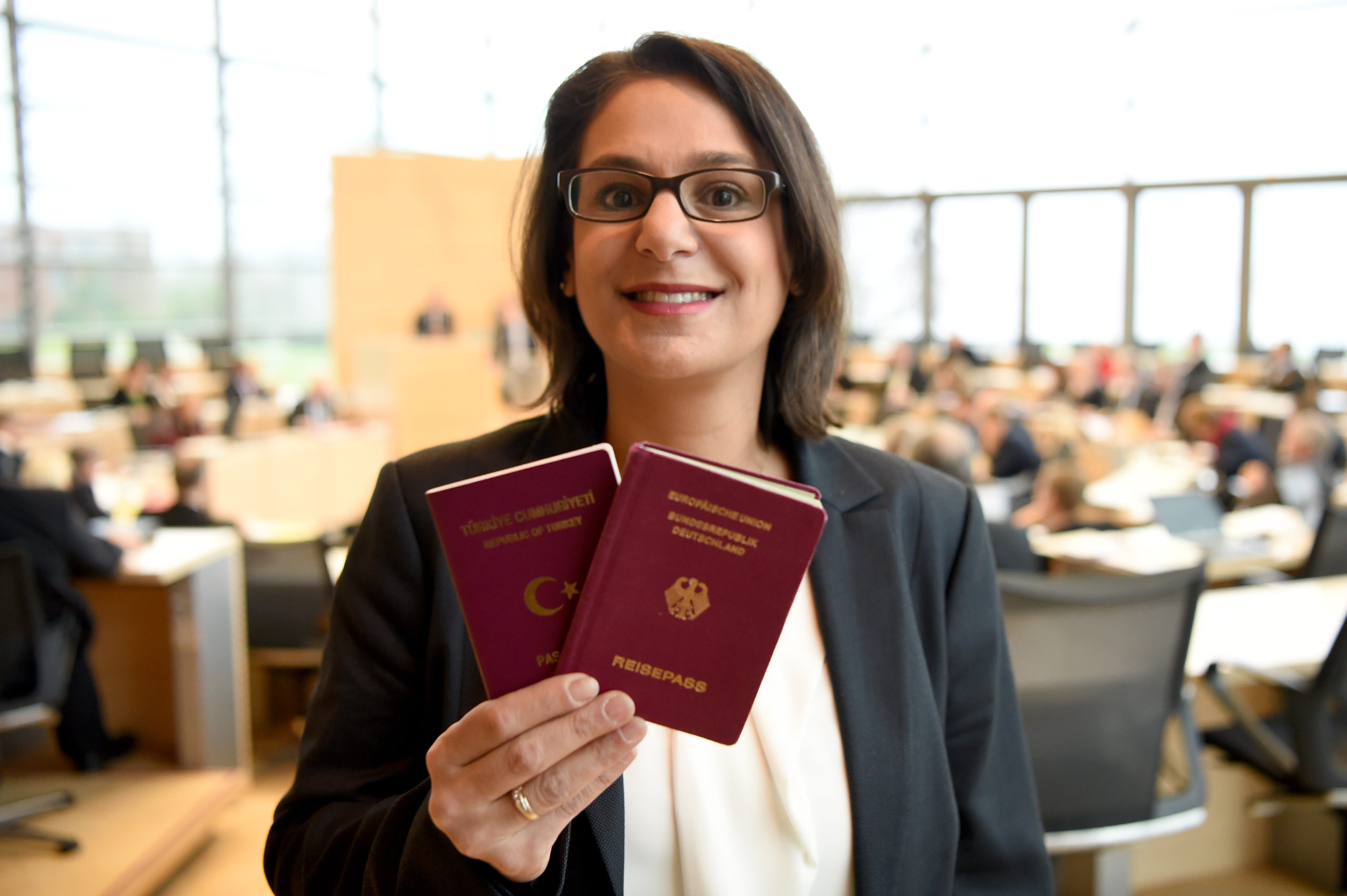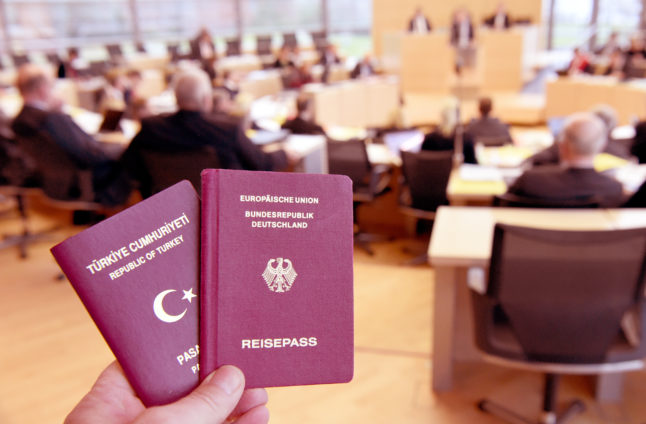When the traffic-light coalition pact was announced last November, the international community in Germany lit up with excitement at a number of planned liberalisations to citizenship law. In particular, the pledge to finally permit dual nationality was a huge relief to foreigners in Germany who had struggled with the idea of giving up their existing nationality to become German.
Third-country nationals like Americans, Indians and Australians were given the hope of gaining EU citizenship, while tens of thousands of Brits were thrilled at being able to regain it. For the largest affected groups – the Turkish Gastarbeiter (guest worker) generation and their relatives – the change offered a chance to recognise both the Turkish and German parts of their identity.
READ ALSO:
- EXPLAINED: What Germany’s new government means for citizenship and naturalisation
- ‘European again’: How changes to citizenship rules will affect Brits in Germany
Since the government has been in power, however, there hasn’t seemed to be much movement on the citizenship front. This has left many wondering whether the issue has been sidelined – and if the government still plans to introduce the changes.
The Local has been in touch with the Interior Ministry and migration policy experts within the traffic-light coalition to find out more. Until then, here’s what we currently know about the plans.
What are the current rules around citizenship?
Currently, people who want to become naturalised citizens in Germany must prove that they have lived in the country for at least eight years, though this can be reduced to six years with advanced language skills and other signs of integration.
For those who wait the full eight years, B1-level German is required, as well as proof of financial stability, “integration into German living conditions” and knowledge of German laws and culture, which is proved by taking a Citizenship Test. People from non-EU countries must also sign a form to say that they are happy to give up their previous citizenship, unless the country they’re from doesn’t allow them to renounce citizenship or they would suffer “financial hardship” from doing so.
People who are married to a German citizen can apply for citizenship after only three years in the country (and two full years of marriage), but must also give up their existing citizenship if they are from a non-EU country.
Children of German citizens, who are automatically entitled to citizenship, are lucky enough to be exempt from the ban on dual nationality, meaning they can keep two or more passports on a lifelong basis. People from other EU countries are also exempt.
But for children of non-Germans and non-EU citizens born in Germany, the situation is a little more tricky: this group is only entitled to German citizenship if their parents have lived in the country for at least eight years and have permanent right of residence in the country. Even then, they must choose between German citizenship and their parents’ citizenship by the time they are 23.
READ ALSO: When is my child entitled to German citizenship?
What are the planned changes to citizenship law?
In its coalition pact, the government says it wants to develop a “modern citizenship law” that offers a much quicker and easier route to naturalisation for people who want to build a life in Germany.
Rather than having to wait eight years, people will be able to apply for citizenship after a maximum of five, while those who speak good German and are well integrated can even get hold of a German passport after as little as three years in the country.
For Turkish guest workers and their relatives, the path to citizenship will be made even simpler with easier language requirements. A “general hardship clause” will also be created to offer exemption from the language requirement in special cases. In addition, the government says it will replace the requirement for “integration into German living conditions” with what it describes as “clear criteria”.
Most significantly for non-EU citizens, the coalition agreement states that the government will “permit the holding of multiple nationalities” – meaning there will no longer be any need to choose between one or more passports.
The children of non-Germans will be granted automatic citizenship if their parents have lived in Germany for at least five years, and they can keep any other citizenships they hold on a lifelong basis.
When will the law be changed?
In response to a question from The Local, an Interior Ministry spokesperson told us that the modernisation of citizenship law had “very high priority”.
“The careful preparation and implementation of this important reform project is in progress,” he told us. “However, it is not to be expected that the legislative project on the Nationality Act can be completed this year.”
When The Local spoke to MPs from the traffic-light coalition in January, migration policy experts explained that the reform would “definitely” be implemented within the four-year legislative period and that it was likely to be one of the first major projects of the coalition.
“Our intent as Green parliamentary group, and I think we’re united in this with our coalition partners in parliament, is to encourage the new Federal Minister of the Interior Nancy Faeser to implement this as one of the first big projects,” said Green Party migration spokesperson Filiz Polat. “No small number of people in Germany have already been waiting a very, very long time for the possibility of naturalisation with acceptance of multinationality.”

READ ALSO: When will Germany relax its dual citizenship laws?
Generally, legislation can take several months to be drafted, put to a vote in the upper and lower houses of parliament and tweaked in the committee and review stages. Then, of course, key questions need to be ironed out about how to implement the change. However, it’s not impossible that there could be significant movement on this in 2023.
One issue that will need to be ironed out is how to avoid citizenship offices becoming overwhelmed with applications once the rules change. Around 11 million people currently live in Germany without citizenship, and if even half of these were to apply as soon as they could, it could easily lead to delays and bottlenecks.
Once again, it’s unclear what the plans are to prevent this happening – if any – but we’ll be sure to update you on all of this as soon as we know more.
Will I be eligible for dual citizenship?
If you’ve lived here for at least five years, can financially support yourself and speak at least B1 German, there’s no reason you shouldn’t be eligible for German citizenship.
If the language requirement is likely to be an issue, now may be the time to enroll in a course so that your skills are up to scratch by the time dual nationality is permitted.

Those who haven’t quite got five years under their belt may well be eligible by the time the rules change. If not, however, the duration of residence can be reduced to three years with a higher level of German (C1 or B2) and possibly an integration course.
We’ll be sure to explain the full criteria for applying for citizenship under the new rules as soon as we know it, but for now, eager would-be Germans can prepare by getting their paperwork in order (digging out old registration certifications and tax returns etc.), making sure their passport is still valid and brushing up on their German skills and the questions in the Citizenship Test (Einbürgerungstest).
READ ALSO: EXPLAINED: How I got German citizenship – and how you can too




 Please whitelist us to continue reading.
Please whitelist us to continue reading.
Will probably die of old age before it happens.